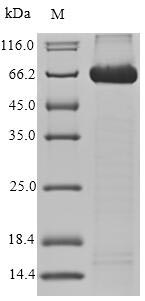The recombinant Human ALCAM protein is made through genetic engineering, also called gene splicing or recombinant DNA technology. By putting Human ALCAM genes into the genetic material of the E.coli system. These microorganisms can be used as factories or producers to make proteins for medical, academic and research uses. DNA to be manipulated it must be placed within a “transport vehicle” in which proteins may be produced from the genetic code of the DNA. The host cells used for Human ALCAM protein synthesis are E.coli cells, the whole production processes include isolation of ALCAM gene, amplification of ALCAM gene, cloning, ALCAM gene selection, and expression, and the ALCAM protein purification, the vector contains N-terminal 6xHis-SUMO tag in addition to the specific DNA sequence, this facilitates the purification of the recombinant protein and it’s finally detected with a purity of 90%+ by SDS-PAGE.
ALCAM, also called CD166, is a cell-cell adhesion molecule that engages in heterotypic interactions via the ligation to CD6 on T cells thus acting in homophilic adhesion complexes between epithelial cells and that acts as a cell surface marker for a group of hematopoietic progenitor cells, multiple mesenchymal stem cells, and cancer stem cells. CD166 is upregulated and considered a valuable prognostic marker of disease progression and dismal survival in several categories of epithelial cancers such as colorectal carcinoma, breast cancer, and pancreatic cancer. Studies have shown that CD166 can play an anti-apoptotic role by enhancing the function of YAP and exert its pro-carcinogenic role by inhibiting FOXO proteins.




